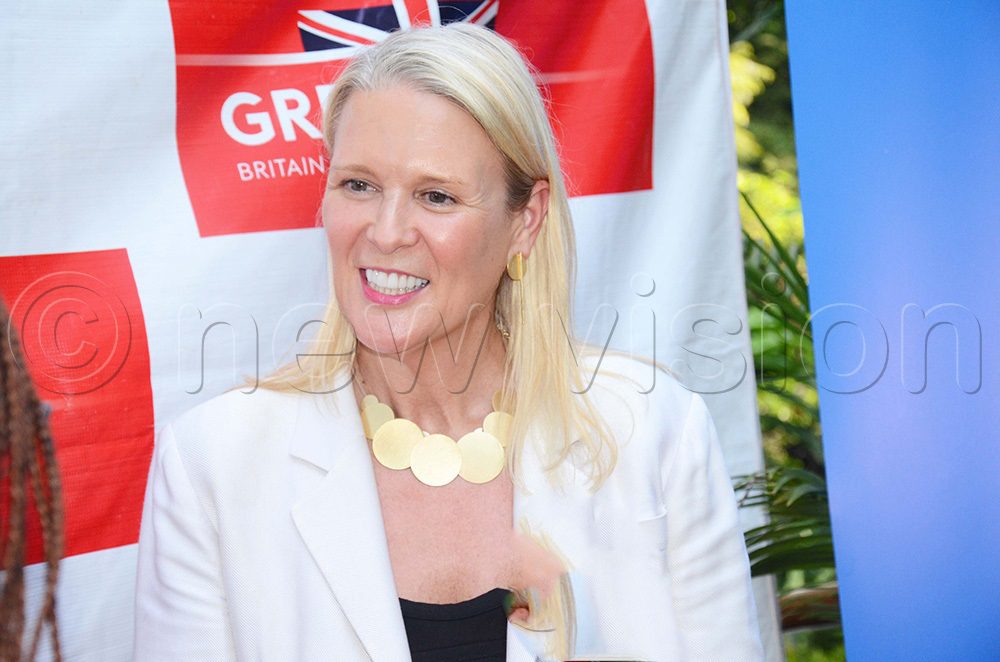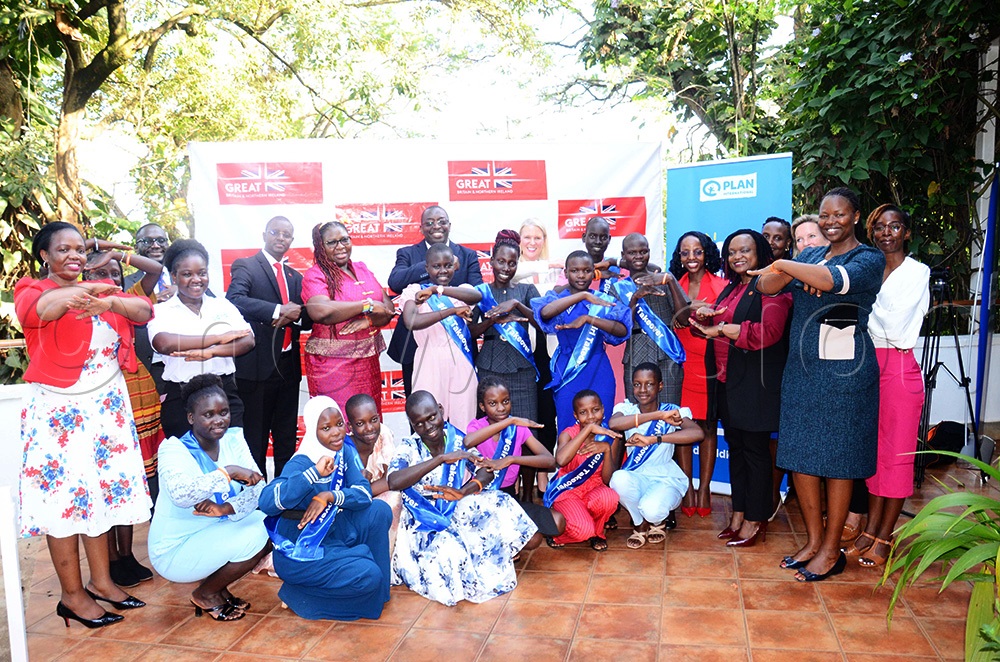British High Commissioner urges girls to prioritise education
Highlighting how access to training, mentorship and opportunities can open doors for girls and power economies, Lisa stressed that it is only through education that girls can acquire knowledge, skills and confidence to make informed decisions about their lives.
The British High Commissioner to Uganda, Chesney Lisa speaking while flanked by girls who were invited at her residence in Kololo, Kampala. (Photo by Isaac Nuwagaba).
__________________
British High Commissioner to Uganda Lisa Chesney (MBE) has urged girls across the country to prioritise education if Uganda is to address vicious cycles of poverty in families.
She said this at the British High Commissioner’s Residence in Kampala on Wednesday, October 8, 2025, during the Girls Take Over Initiative visit.
Highlighting how access to training, mentorship and opportunities can open doors for girls and power economies, Lisa stressed that it is only through education that girls can acquire knowledge, skills and confidence to make informed decisions about their lives, including their health, relationships and careers.
The British High Commissioner to Uganda, Chesney Lisa addressing the media on challenges of child marriages at her residence in Kololo Kampala. (Photo by Isaac Nuwagaba)
“Education is a fundamental right and a key driver of personal and national growth. A skilled girl becomes a skilled woman and mother who can help the family to survive,” Chesney said.
Chesney stressed that girls need at least 12 years of quality education to unlock their full potential, which she said can be realised through skilling.
“Skilling the girl child creates avenues for work participation to foster development right from families. Girls should focus on the future and get married later at an advanced stage when they are able to take responsible decisions,” she added.
“International frameworks have been localised, and laws in Uganda are in place to protect the rights of women and girls and to empower them to lead. Every girl deserves the chance to lead, learn and earn,” Liza emphasised.
Lisa pledged a positive role, calling development partners to bring collective change to help in the skilling of girls in vulnerable communities, citing the northern and eastern parts of Uganda.
The Uganda Demographic and Health Survey (UDHS) 2022 survey shows that women marry more than five years earlier than men, on average. The median age at first marriage is 18.8 years for women age 25- 49 and 24.8 years for men age 25-49.
"The median age at first marriage for women age 25-49 and for men age 25-54 has increased slightly since 2000-01 (among women, from 17.8 years to 18.7 years to 18.8 in 2022; for men, from 22.3 years to 23.3 years and dropped to 23%).
During the same time period, the percentage married before age 18 declined among women age 25-49 from 53% to 43% to 42% (for 2011,2016 and 2022 UDHS); among men age 25-54, there are minimal changes ranging from 8% to 10% and 13% in the same period," the report reads.
Breaking the cycle of early marriages
Early marriage is a significant obstacle to girls' education and empowerment. It denies them their childhood, limits their opportunities, and increases their vulnerability to health risks, poverty, and domestic violence.
“By prioritising education, girls can break this cycle and forge a brighter future for themselves and their communities,” Liza insisted.

The British High Commissioner to Uganda, Chesney Lisa with the children from across Uganda in a group picture. (Photo by Isaac Nuwagaba)
Plan International Uganda country director Phoebe Kasoga observed that when girls are educated, they become agents of change, driving progress in their families, communities and the nation at large.
“They are more likely to marry later, have fewer children and contribute to the economy. Educated girls are also better equipped to challenge harmful gender norms and promote equality,” she said.
"Each year, we commemorate the International Girl Child Day, but we challenge the girl child, irrespective of backgrounds, to take over the career roles of providing for their families in future after their education. We emphasise protection of children, education of girls to help them realise their potentials and dreams, and we advocate for an end to child marriages.”
This year, Kasoga said, they are focusing on girls’ experience of child marriage, a practice that, despite large-scale policy action and legislative reforms, remain widespread.
“Combined with entrenched social and gender norms, the most pressing cause of child marriage is poverty,” Kasoga said.
Absa Uganda executive director and chief finance officer, Micheal Segwaya, said they are committed to working with communities to challenge attitudes towards child marriage and shift harmful norms and practices.
“We shall keep supporting girls to have access to essential services and psychosocial support. Through our product packages, we encourage the victims to engage in savings and form economic groups that lift them out of poverty,” he said.
Jane Muya, a 20-year-old S3 leaver from Adjumani district who was married off at 13 years and got twins at the age of 14 years, asked parents to adopt positive parenting and uplift the rights of a girl child to bring an end to child marriage.
“We need skills to help us expand economic opportunities for girls. It is essential to understand the different factors behind child marriage in each context to inform how best to respond, prevent it from happening and provide support for affected children,” she said.